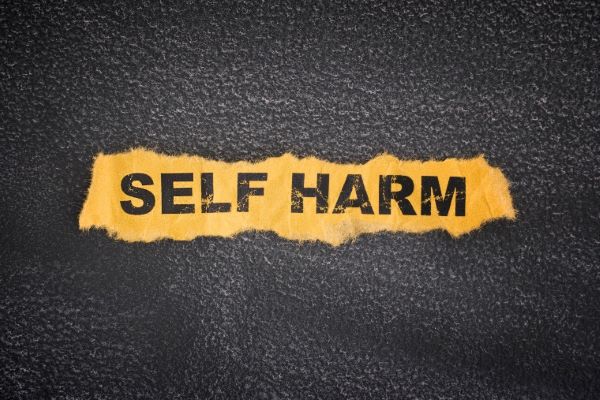
 This article provides practice tips from Community Care Inform’s guide on adults who self-harm. The full guide covers the signs that social workers should be aware of that may indicate self-harm, the risks associated with particular groups or situations and what to do if self-harm is confirmed.
This article provides practice tips from Community Care Inform’s guide on adults who self-harm. The full guide covers the signs that social workers should be aware of that may indicate self-harm, the risks associated with particular groups or situations and what to do if self-harm is confirmed.
The guide was updated in July 2024 by Briony Spedding, a senior lecturer at Manchester Metropolitan University and practising approved mental health professional.
Inform Adults subscribers can access the full content here.
When practitioners are working with adults going through challenging times, they should be especially aware of signs that may indicate self-harm, thoughts of self-harm or a deterioration in a person’s mental state.
Factors that increase vulnerability to self-harm
In particular, they should be alert to factors that can increase someone’s vulnerability, for example, mental health needs or demographic factors such as poverty or homelessness.
All social workers, not just those working in mental health services, should be aware that rates of self-harm are higher in marginalised groups, for example, ethnic minorities, sexual minorities, asylum seekers, people in the criminal justice system and those who have lost loved ones through suicide.
People sometimes harm themselves when they are under stress for a variety of reasons. These include domestic abuse, financial abuse or other forms of exploitation, financial difficulty/poverty, separation and loss.
If you discover that someone has started to self-harm, it could indicate that something in their life is upsetting them and they might benefit from having some support.
If self-harm is suspected or needs to be considered as a possibility, you should be prepared to explore this in social work visits, assessment or interventions.
Practice tips
- Try to be calm and reassuring. When asking questions, try to do this as sensitively as possible.
- Say clearly that you are asking questions to help and that the person is not in trouble. Tell them that you can provide or arrange for support. If possible, ask whether they have been supported by mental health services before and try to obtain their consent to share information with other mental health professionals.
- As part of an assessment, you should make sure you are clear about what support or involvement, if any, the person has had from other services in the past, either in relation to their mental health generally or self-harm in particular. This information might be included in the referral to your team, it might already be available in records held by your organisation or you may need to make contact with other organisations to find it out.
- When people have moved from another area or have been transferred from children’s services to adults’ services, contacting their GP is a good way to find out what care, support or treatment they have had in the past, as well as asking the person themselves during the assessment.
- Always treat the person with respect and dignity and try to give them as much control over what happens next as you can.
- Check if they are willing to share anything with you which they think may have contributed to them hurting themselves. This might relate to recent stressors such as difficulties at home, having had an argument with someone or losing a job, or it might relate to their psychological state such as feeling low in mood.
- In some cases, it may be necessary to sensitively unpick whether the harm relates to self-harm or has been caused by another person. Inevitably, this requires careful handling. To have this kind of conversation, the person must feel comfortable speaking to you and, where possible, they should be given the option to have someone they know and trust present to support them if this would help.
- It can be hard for people to tell someone that they have harmed themselves. Feelings of shame and the fear of rejection can be factors. Acknowledge how difficult it might have been for them to share this information with you.
- Remain calm and non-judgmental, be prepared to listen and give them time to talk. If someone has harmed themselves, there will be a reason for this, but they might not understand why they have done it. It is important to try and work collaboratively with them and for them to feel in control of what happens next.
- People do not always recognise that the behaviour and actions of others are abusive. Sometimes the harm you are investigating will have been directly caused by others, but sometimes others’ abusive behaviour will have precipitated self-harm. Where you suspect abuse in either form, you will need to probe the person’s use of language, for example, when they say someone has “borrowed” money from them, do they really mean that they have stolen it, or when they say that somebody “pushed” them, do they mean that they struck out?
Practitioners should remember that people who self-harm do not always do so as a result of mental illness; levels of risk can also be affected by social isolation and adverse life events.
Psychosocial stressors can have a significant impact in terms of self-harm, sometimes involving people who are already regularly involved with adult social care. It is worth taking the time to ask questions and act on any answers that suggest someone is at risk of self-harm.
If you have a Community Care Inform Adults licence, log in to access the full guide and read more detailed information on the signs that social workers should look out for and what to do if self-harm is confirmed.
Useful resources on self-harm
- Samaritans, freephone 116 123
- Mind’s self-harm webpage provides information about helplines and other sources of support
- Young people’s suicide prevention charity Papyrus
- Training and support organisation Self Injury Support.
- Online support forum run by the National Self Harm Network.
We understand that the issues set out above will apply to some practitioners, so please consider making use of any of the resources listed above that you feel would be helpful to you.






 Bournemouth, Christchurch and Poole
Bournemouth, Christchurch and Poole  Hampshire County Council
Hampshire County Council  Lincolnshire County Council
Lincolnshire County Council  Norfolk County Council
Norfolk County Council  Northamptonshire Children’s Trust
Northamptonshire Children’s Trust  South Gloucestershire Council
South Gloucestershire Council  Wiltshire Council
Wiltshire Council  Wokingham Borough Council
Wokingham Borough Council  Children and young people with SEND are ‘valued and prioritised’ in Wiltshire, find inspectors
Children and young people with SEND are ‘valued and prioritised’ in Wiltshire, find inspectors  How specialist refugee teams benefit young people and social workers
How specialist refugee teams benefit young people and social workers  Podcast: returning to social work after becoming a first-time parent
Podcast: returning to social work after becoming a first-time parent  Podcast: would you work for an inadequate-rated service?
Podcast: would you work for an inadequate-rated service?  Family help: one local authority’s experience of the model
Family help: one local authority’s experience of the model  Workforce Insights – showcasing a selection of the sector’s top recruiters
Workforce Insights – showcasing a selection of the sector’s top recruiters 

 Facebook
Facebook X
X LinkedIn
LinkedIn Instagram
Instagram
Very helpful. Thank you.